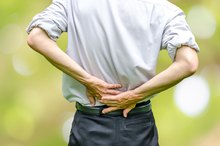What does fact checked mean?
At Healthfully, we strive to deliver objective content that is accurate and up-to-date. Our team periodically reviews articles in order to ensure content quality. The sources cited below consist of evidence from peer-reviewed journals, prominent medical organizations, academic associations, and government data.
The information contained on this site is for informational purposes only, and should not be used as a substitute for the advice of a professional health care provider. Please check with the appropriate physician regarding health questions and concerns. Although we strive to deliver accurate and up-to-date information, no guarantee to that effect is made.
Rectal Hernia Symptoms
Rectal hernias are rare and often confused with hemorrhoids. Pain, swelling and discomfort are typical of both conditions, so knowing the difference between the two is an important step in treatment. As with any medical condition, it is important that you speak to a medical professional about your symptoms.
Distinction
Hernias are a protrusion of soft tissues through a hole in a muscle. Hemorrhoids are itchy or painful areas on the anus near the rectum. Both can be very painful, but only hemorrhoids cause bleeding and itching. Rectal prolapse is also sometimes confused with a rectal hernia 12. With a prolapse, symptoms are closer to those of hemorrhoids, but include:
- pain when defecating
- mucus or blood in the stool,
- the detection of something protruding when wiping after a stool
- Hernias are a protrusion of soft tissues through a hole in a muscle.
- With a prolapse, symptoms are closer to those of hemorrhoids, but include: * pain when defecating
* mucus or blood in the stool,
* the detection of something protruding when wiping after a stool
Visible Signs
Hernia Signs and Symptoms in a Male
Learn More
If there is a lump or protrusion at or near the rectum, there is a good chance it is a hernia, though other conditions can also produce similar lumps (such as cancer) 1. Hernias can also be painful when touched and move as digestion takes place.
Causes
Strain, lifting heavy objects and obesity can cause hernias. Other causes include a family history of hernias or a build-up of fluids that puts pressure on the abdomen.
Prevention/Solution
Inguinal Hernia Symptoms in Women
Learn More
The best way to prevent rectal hernias is to lose weight, visit a physician regularly, not strain during defecation and use proper form when lifting heavy objects. If a hernia occurs, surgical procedures can push the protruding tissues back into the cavity and close the rip or hole in the muscle wall 1.
Warning
Hernias cannot be treated at home. Attempting to push the tissue back into place on your own can cause more damage.
Related Articles
References
- NIH; Hernia
- E-Medicine; Rectal prolapse
- Fitzgibbons RJ, Forse RA. Groin hernias in adults. N Engl J Med. 2015;372(8):756-763. doi:10.1056/NEJMcp1404068
- Merriam-Webster Dictionary. Definition of HARUSPEX. Updated 2020.
- Mahadevan V. Essential Anatomy of the Abdominal Wall. In: Kingsnorth A, LeBlanc K, eds. Management of Abdominal Hernias. Fourth. London: Springer Science & Business Media; 2013:25-55.
- M BS. SRB’s Manual of Surgery. Sixth. London: Jaypee Brothers, Medical Publishers Pvt. Limited; 2019:739-776.
- Wang H, Naghavi M, Allen C, Barber R, Bhutta ZA, Carter A. Global, regional, and national life expectancy, all-cause mortality, and cause-specific mortality for 249 causes of death, 1980–2015: a systematic analysis for the Global Burden of Disease Study 2015. The Lancet. 2016;388(10053):1459-1544. doi:10.1016/S0140-6736(16)31012-1
- Hoffmann H, Walther D, Bittner R, Köckerling F, Adolf D, Kirchhoff P. Smaller inguinal hernias are independent risk factors for developing chronic postoperative inguinal pain (CPIP). Annals of Surgery. 2020;271(4):756-764. doi:10.1097/SLA.0000000000003065
- Dhua AK, Aggarwal SK, Mathur N, Sethi G. Bilateral congenital diaphragmatic hernia. APSP J Case Rep. 2012;3(3):20. PMID: 23061036
Writer Bio
Michael Hinckley received a Bachelor of Arts degree in US history from the University of Cincinnati, a Master of Arts degree in Middle East history from the University of California at Santa Barbara. Hinckley is conversant in Arabic, and is a part-time lecturer at two Midwestern universities.








